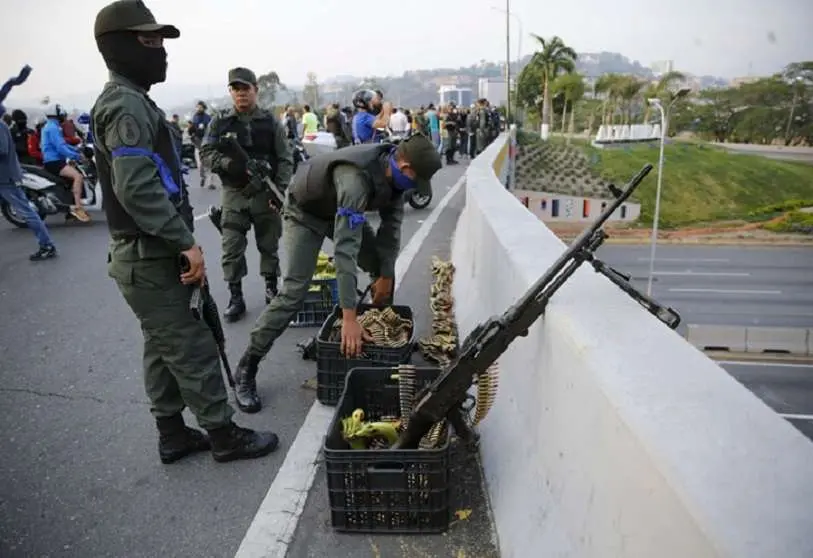Experts warn about the danger for Venezuela of dependence on Russia, China, Iran and Cuba for military matters

A few days ago, Nicolás Maduro, president of Venezuela, announced the creation of the Venezuelan Military Council under the advice of the Islamic Republic of Iran, Russia, China and Cuba, leaving the possibility open of foreign military intervention.
The Iranian, Russian, Chinese and Cuban military support may take its toll on Nicolás Maduro's Bolivarian government, bearing in mind the difficulties the country is experiencing, which is plunged into an abysmal financial, political and social crisis. The Caribbean country would be unprepared for intervention owing to the serious problems it is experiencing, including exorbitant inflation and debt and a social breakdown brought about by the tight control of the Bolivarian regime, which has been denounced by the opposition.
Several experts also point out that this foreign interference could also lead to a certain lack of co-ordination in the Venezuelan army.
The Chavista regime, which has been at odds with the United States for years and has applied political and economic sanctions that have a decisive impact on the country, has drawn increasingly closer to other nations that are in the throes of confrontation with the American giant for one reason or another, such as Iran, China, Russia and Cuba.
The announcement of the creation of the Military Council is fairly striking owing to Venezuela's submission to these countries, which could be more interested in the Caribbean country's huge energy resources than in its perhaps ideological or geopolitical proximity.
Various military experts warn of the serious damage this issue could do to the country's sovereignty and the price Venezuela will have to pay for the supposed foreign advice. They also claim that the Venezuelan armed forces are not even prepared to face attacks, even with the weapons and tanks acquired by the state. This is what four Venezuelan army officers consulted by the Infobae media have pointed out.
In this regard, Colonel Alfonso Zambrano assured Infobae that the Venezuelan arms system will no longer be independent as the dictatorship claimed. "Russia, China, Iran and Cuba do not give a blank slate; any support to the government, not to the armed forces, will be more than paid for: with Venezuelan minerals or, perhaps, being allowed a military base of these countries in Venezuelan territory, to be closer to the United States.
We will have to see whether those in the north will allow it, although if Biden wins (in reference to the forthcoming US elections between Donald Trump and Joe Biden), it may be possible", warned Colonel Zambrano.

Army General Gonzalo García Ordóñez also agrees with this view. "The regime has made Venezuela a piece on the chessboard of the system, just as Cuba has been in recent decades, as is Nicaragua, and now Bolivia, which is returning to the path," he said.
In October Maduro said that the Colombian army was training "more than 1,000 mercenaries" and repeated this as an excuse for creating its Military Council under foreign advice.
These are "mercenaries, terrorists who are trying to infiltrate Venezuela and sabotage the political and electoral climate that should lead us to the elections for the National Assembly on 6 December," said the pro-Chávez leader in statements reported by the Vanguardia.
In this scenario, the military consulted by Infobae agree on the Venezuelan army's poor logistical capacity. "To be honest, I don't think our armed forces are prepared to resist any attack," Zambrano said.
On the other hand, Major General Hebert Josué García Plaza pointed out that "by creating a mixture of different doctrines and different teams, such as the Chinese and the Russians and Iranians, what is going to cause is a great deal of confusion that is difficult to understand for anyone carrying out the military operation with regard to how it should be coordinated". Mr García Plaza added that this strategy has a bearing on even greater dependence on the military doctrine of certain countries aligned against the United States.
With regard to human and material resources, he explained that the military currently do not carry out training exercises in military tactics and that logistical means and communications equipment would not withstand a prolonged conflict.
The problem is exacerbated by the military subgroups set up by Chavism in previous years, such as REDI (Strategic Region of Integral Defence) and ZODI (Integral Defence Operating Zone). "The components, responsible for equipping and training personnel, are now not doing so and neither are the REDI and ZODI. The military units were left in the limbo of those who prepare and train tactical units and superior units for a conflict," he said.
Furthermore, one official who asked not to reveal his identity described the Council as "the perfect excuse" for justifying the interference of Russia, China, Iran and Cuba. This source also stressed that the weapons system has not been properly maintained, which has widened the technological gap, leading Venezuela to the systems of undeveloped countries.








